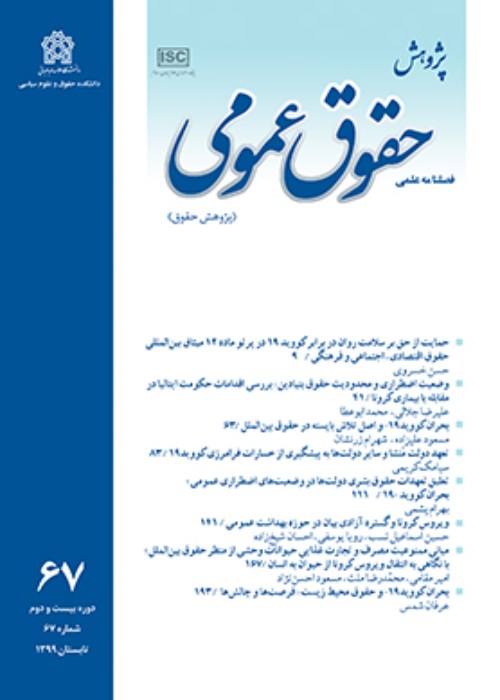An Evaluation of the Particular Examples of the Abuse of Dominant Position by the Use of Big Data in Competition Law
The development of digital markets and the increasing importance of big data has brought new challenges in the concept of abuse of dominant position. In platform markets, the entry barriers and the presence of big tech giants (gatekeepers) who have taken over the market by employing big data, make it difficult for newcomers to enter the market and there is a good opportunity for big data companies to abuse their dominant position and commit anti-competitive practices, all of which brings new issues to antitrust law.
It is clear that we can apply general rules on the abuse of dominant positions and monopolizing in the big data field. This article clarifies how abusive behaviors such as unilateral refusal to share necessary big data or restricting access to it can disrupt competition in downstream or adjacent markets and also, how deceptive practices of platforms in collecting data have gradually surfaced in the realm of competition law. This research also analyzes price discrimination and predatory pricing by using big data and the challenging issue of entering other markets by leveraging big data.
Literature Review:
There are no studies in Iranian legal literature that discuss different aspects of the abuse of dominant position by use of big data. Viewing the challenges from the perspective of Iranian Competition Law, the current research analyzes the issues and provides some particular solutions for the first time.
The method of this research is descriptive-analytical done by a comparative approach.
Generally, refusing to share or restricting access to big data may be considered an abuse of one’s dominant position under certain circumstances. Various factors should be considered such as whether the data is first-second- or third-party, alternative sources to access the big data, the effect of the refusal or the restriction on competition in the related markets, the process of providing new products and services, and the incentives for innovation and investment.
Recent approaches to the deceptive collection of data indicate the significance of competitive and economic dimensions of personal data. Since solutions outside the realm of antitrust law are not sufficient to regulate and protect these data, employing decisive remedies of competition law seems justified.
Regarding abuse of pricing powers, if price discrimination among users is done by collecting and analyzing big data and tracking and discovering their preferences, and leads to a reduction in the price of products or services and brings real and long-term efficiency, it would be desirable from the perspective of competition law. However, it should be noted that if this arrangement becomes an abusive behavior to restrict the competition for other companies or lay the groundwork for predatory pricing in the future, in such a way that other competitors lose their ability to compete, antitrust law should intervene to prevent this abuse of big data.
In addition, platforms are not allowed to abuse the big data that they gather in their system to facilitating the way for themselves or their partners and their related companies to improperly penetrate adjacent or vertical markets at the expense of weakening competitors. Also, tying any kind of products or services to data that the applicants do not need between which no reasonable linkage can be imagined is an example of improper tying arrangements and abuse of a dominant position, which is condemned in antitrust law. In fact, self-preferencing by using data is in itself contrary to competition law norms if it results in a significant disruption of competition.
In the Iranian competition law, although the existing general rules and regulations may be effective to a relatively small extent when facing abuse of a dominant position by way of big data, one cannot ignore the shortcomings and inefficiency of these legal frameworks and the necessity to adopt new competition strategies in the light of the diverse aspects of digital markets and as the rising importance of big data. Although some new approaches taken in the Strategic Plan Of the Islamic Republic of Iran in Cyber Space can be seen, those policies and solutions are not in line with competition law standards, the requirements of Iran's digital markets and the big data challenges, and the proposed views lack the necessary legal-technical justification.
In fact, the aforementioned document has failed to codify the fundamental principles of competition law in platform markets by not setting the basic foundation and taking the initial steps in the right direction. It points to modern approaches to competition law, controversial in matters which legal systems are dealing with in academic and judicial circles. Despite these considerations, it seems that, especially in Iran, in the absence of an effective competition system and strong monitoring arrangements on the practices of companies, platforms with a dominant position have a real chance to abuse big data, and so, it is incumbent to take stronger measures and remedies to regulate and inspect the behaviors of companies while respecting the fundamental principles and standards of antitrust law.
- حق عضویت دریافتی صرف حمایت از نشریات عضو و نگهداری، تکمیل و توسعه مگیران میشود.
- پرداخت حق اشتراک و دانلود مقالات اجازه بازنشر آن در سایر رسانههای چاپی و دیجیتال را به کاربر نمیدهد.


